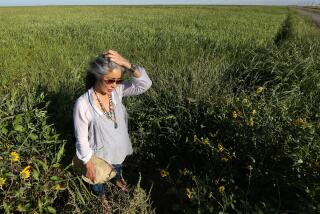Roy F. Farmer, 87; Built Family Coffee Company
- Share via
Roy F. Farmer, the strong-willed patriarch who transformed a small family business into one of the West’s largest commercial coffee roasters, died Tuesday after a lengthy battle with cancer. He was 87.
Farmer, who was chairman of Torrance-based Farmer Bros. Co., died at home, company officials said.
The company has not named a successor. For five decades, Farmer served as chief executive of the business founded by his father in 1912, pushing the company into 28 states. He relinquished the CEO post last year to his son, Roy E. Farmer.
“It is a sad day for the coffee industry. Roy Farmer was a real pioneer,” said Pedro Gavina, president of F. Gavina & Sons, a rival regional coffee company based in Vernon.
Farmer was known for being an early proponent of the use of high-speed packaging equipment and continuous-feed roasters to process coffee and slash expenses. He also had the company maintain its own fleet of trucks to supply its satellite sales offices and to ensure Farmer Bros. had control over its distribution and transportation costs.
A hands-on executive who in his younger days effortlessly hauled 132-pound burlap sacks of green coffee beans around the company’s Torrance roasting plant, Farmer spent his entire working life at his family’s business, except for service in the U.S. Army during World War II.
During his long tenure -- Farmer joined the company full time after graduating from Manual Arts High School in 1935 -- he did everything from driving trucks to roasting coffee to overseeing sales efforts.
In 1952, Farmer took Farmer Bros. public, selling stock and raising the funds needed to pay estate taxes upon the death of his father and to launch the company’s expansion throughout the Western United States.
Under his leadership, Farmer Bros. grew from 380 employees and annual revenue of about $15 million to more than 1,100 employees and about $190 million in revenue today. The company has a stock market value of more than $500 million, making it one of the largest publicly traded food processors based in California.
Although he earned millions of dollars in salary during his later years as chief executive, Farmer maintained a spartan lifestyle. He kept his cars for a decade or more and he had lived with his wife, Emily, in a modest home in Ladera Heights for the last three decades. He refused to talk to the news media or the Wall Street investment community about the business.
Farmer also was known for his passionate devotion to the company, which on occasion landed him in trouble with outside shareholders and even relatives. He once attempted to keep his sister, Catherine Crowe, off the board of directors, sparking a decades-long family feud that ended only recently when the company bought out the interests of the Crowe family in December for $111 million.
“Farmer Bros. was Roy’s life’s work,” said Lew Coffman, a member of the company’s board since 1983 and its former vice president of sales.
Coffman said the two didn’t always agree, but he appreciated how well Farmer managed “a company that grew beyond anyone’s expectations.”
“He tried to put the right people in the right jobs, and let them do their work,” he said.
Farmer is survived by his wife of 58 years, Emily; four children, Carol Farmer-Waite, Jeanne Farmer-Grossman, Roy E. Farmer and Richard Farmer; and four grandchildren.
More to Read
Inside the business of entertainment
The Wide Shot brings you news, analysis and insights on everything from streaming wars to production — and what it all means for the future.
You may occasionally receive promotional content from the Los Angeles Times.










